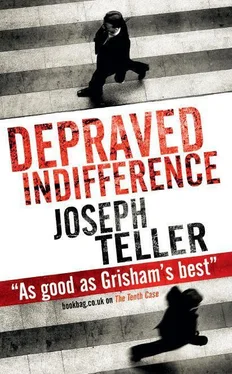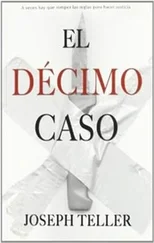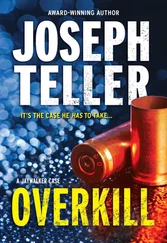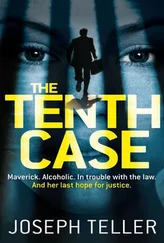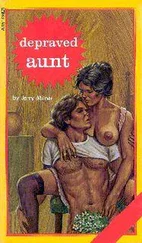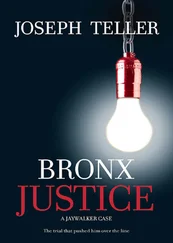Joseph Teller - Depraved Indifference
Здесь есть возможность читать онлайн «Joseph Teller - Depraved Indifference» — ознакомительный отрывок электронной книги совершенно бесплатно, а после прочтения отрывка купить полную версию. В некоторых случаях можно слушать аудио, скачать через торрент в формате fb2 и присутствует краткое содержание. Жанр: Криминальный детектив, на английском языке. Описание произведения, (предисловие) а так же отзывы посетителей доступны на портале библиотеки ЛибКат.
- Название:Depraved Indifference
- Автор:
- Жанр:
- Год:неизвестен
- ISBN:нет данных
- Рейтинг книги:3 / 5. Голосов: 1
-
Избранное:Добавить в избранное
- Отзывы:
-
Ваша оценка:
- 60
- 1
- 2
- 3
- 4
- 5
Depraved Indifference: краткое содержание, описание и аннотация
Предлагаем к чтению аннотацию, описание, краткое содержание или предисловие (зависит от того, что написал сам автор книги «Depraved Indifference»). Если вы не нашли необходимую информацию о книге — напишите в комментариях, мы постараемся отыскать её.
Depraved Indifference — читать онлайн ознакомительный отрывок
Ниже представлен текст книги, разбитый по страницам. Система сохранения места последней прочитанной страницы, позволяет с удобством читать онлайн бесплатно книгу «Depraved Indifference», без необходимости каждый раз заново искать на чём Вы остановились. Поставьте закладку, и сможете в любой момент перейти на страницу, на которой закончили чтение.
Интервал:
Закладка:
SHEETZ: Continuing to brake, he turned the van's steering wheel clockwise, to the right.
FIRESTONE: With what result?
SHEETZ: The result was that the van began to drift, then fishtailed FIRESTONE: What do you mean by "fishtailed"?
SHEETZ: Imagine a fish with a vertical tail. In other words, one that is constructed up and down (Demonstrates), rather than, say, sideways, like the flukes of a whale (Demonstrates). The fish propels itself forward by thrusting its tail back and forth, to the left, then the right (Demonstrates). "Fishtailing," as I use the expression, occurs when the rear of a vehicle swings back and forth in much the same fashion. But instead of occurring as the vehicle is being propelled forward, it occurs because the vehicle's rear wheels have lost traction with the road surface. Next there'd come a point where the skid marks had ended altogether, indicating that the van had literally become airborne. When it had touched down again, it had done so briefly, on the shoulder of the road. From there it had bounced and gone through the guardrail and over the embankment, flipping over several times before landing, exploding, and bursting into flames.
FIRESTONE: In your opinion, what caused it to explode?
SHEETZ: It's not possible to know precisely, but in all probability a spark occurred, created by the rubbing of metal against metal, or perhaps metal against rough dry pavement. And that spark ignited gasoline fumes, which are extremely volatile.
Sheetz had taken a number of photographs of the skid marks, the embankment and the charred remains of the van. Firestone had them marked in evidence, and had his witness describe what was depicted in each photo, and the significance of it in understanding the actions of the van's driver. In this way, Firestone was able to have his expert describe what had happened a second time. And just in case that wasn't enough, Sheetz had taken measurements and created a rough diagram, which he'd subsequently converted into a large, full-color, professional-quality exhibit. That, too, was now received in evidence and then explained in detail by the witness. So the jurors were treated to yet a third version of the events. But if any of them seemed to mind, their faces weren't showing it.
Every one of them continued to give John Wayne their rapt attention.
Next, Firestone turned to the issue of speed. Was it possible, he wanted to know, to determine how fast the van had been moving when its driver had first hit the brakes? Yes it was, replied Sheetz. By measuring the length of the skid marks, factoring in the coefficient of friction of the road surface, and referring to charts that had been developed from thousands of hours of testing, one could come up with the speed of the van within a margin of error of five percent.
FIRESTONE: And what answer did you come up with?
SHEETZ: According to my observations and calculations, when the van's wheels first locked up, it was traveling at a speed of forty-six miles per hour, give or take two and a half miles an hour either way, at most.
FIRESTONE: In other words, under the speed limit?
SHEETZ: Yes, sir.
FIRESTONE: Now assume for a moment that the object that the van's driver had been attempting to avoid hitting was an oncoming car, directly in the van's lane. Are you able to tell us how fast that oncoming car was traveling?
SHEETZ: No, I'm not.
FIRESTONE: Why not?
SHEETZ: Because I found no skid marks at all coming from the opposite direction. So I had nothing to measure, nothing to start with.
FIRESTONE: Can you tell us anything from the absence of skid marks coming from that opposite direction?
SHEETZ: Yes, I can.
FIRESTONE: What's that?
SHEETZ: I can tell you that the driver of that oncoming car never braked, never tried to stop or even slow down.
To Jaywalker's way of thinking, it would have been a powerful moment to stop. But Firestone wanted even more. Why settle for a mere kill, after all, when you can follow it up by ripping out your victim's bloody heart, and hoisting in the air for all to see?
In the days following Carter Drake's surrender, Firestone had obtained a search warrant for his Audi, and troopers had gone to the Manhattan garage where it was stored. Unlike Jaywalker's open-air, seventy-fivedollar-a-month parking spot in the middle of the Hudson River, Drake's spot was indoors. It was heated in the winter and air-conditioned in the summer. The spot had been purchased several years earlier for $128,500, a figure that included neither the monthly maintenance charge of $2,585 nor the additional service fee of $975. Tips, while not required, were encouraged, and were also extra.
The troopers had towed the Audi up to a more modest garage in New City, where William Sheetz and other investigators from his squad had spent five hours going over it.
FIRESTONE: What did you find?
SHEETZ: We found nothing out of the ordinary. There was no indication of external damage. The steering system was intact. The brakes were fully functional. The windshield was clean and unobstructed, and provided a good view of whatever was ahead. The headlights worked, both high beams and low. The horn worked.
FIRESTONE: In other words JAYWALKER: Objection.
THE COURT: Yes. Please don't summarize the witness's testimony.
FIRESTONE: Were you able to come up with any explanation as to why the driver might have failed to see the van?
SHEETZ: No.
FIRESTONE: Or why he'd been driving in the wrong lane?
SHEETZ: No.
FIRESTONE: Or why he never tried to slow down or stop?
SHEETZ: No. No explanation at all.
And that was where Firestone left it.
Jaywalker glanced at his watch before collecting his notes and walking to the podium. It was after four o'clock. William Sheetz would be the last witness of the day, and of the entire week, for that matter. Jaywalker loved nothing more than to send jurors off for the weekend on a high note for the defense. But given this particular witness's testimony, that was going to be a tall order. Still, he had a couple of points to make, and he did some quick thinking on how to save the best for last. And then, as he so often did, he started where his adversary had left off.
JAYWALKER: Is it fair to say, Investigator Sheetz, that you've investigated a number of accidents that included a leaving-the-scene component?
SHEETZ: Yes, sir.
JAYWALKER: Dozens?
SHEETZ: Yes, sir.
JAYWALKER: Hundreds?
SHEETZ: Yes, sir.
JAYWALKER: Thousands?
SHEETZ: I'd say so.
JAYWALKER: And you'd agree, would you not, that in most, if not all, of those cases, you were able to discover some evidence that the driver of the vehicle that left the scene at least slowed down before doing so?
It was vintage Jaywalker. He had no idea at all if that was true or not. But the way he'd worded the question made it almost impossible for the witness not to answer in the affirmative. First, by inviting him to agree with the very first question out of his mouth, Jaywalker was making it easy for Sheetz to do so. If he disagreed right off the bat, he risked coming off as overly argumentative. Next, by using the phrase most, if not all, rather than something like almost all or the vast majority, Jaywalker was looking for agreement on no more than a bare majority of accidents. But later on, the jurors would forget the qualifier "most" and remember the absolute "all." Then, by using the words you were able to discover some evidence, he was appealing to Sheetz's ego and prowess as an investigator. A negative response could be construed as damaging to either or both of those things, a positive one as reinforcing them. On top of that, the supposition underlying the question, that even a motorist who eventually decided to leave the scene would experience a moment of indecision before driving off, made sense. It was consistent with everyday human experience. You slowed down, even briefly considered stopping, before you panicked and sped off. And finally, by pretending to be reading the question verbatim from some learned treatise, rather than springing it ad lib from his own devious imagination, Jaywalker was warning the witness that if he disagreed with the premise, he risked challenging an authority in the field.
Читать дальшеИнтервал:
Закладка:
Похожие книги на «Depraved Indifference»
Представляем Вашему вниманию похожие книги на «Depraved Indifference» списком для выбора. Мы отобрали схожую по названию и смыслу литературу в надежде предоставить читателям больше вариантов отыскать новые, интересные, ещё непрочитанные произведения.
Обсуждение, отзывы о книге «Depraved Indifference» и просто собственные мнения читателей. Оставьте ваши комментарии, напишите, что Вы думаете о произведении, его смысле или главных героях. Укажите что конкретно понравилось, а что нет, и почему Вы так считаете.
